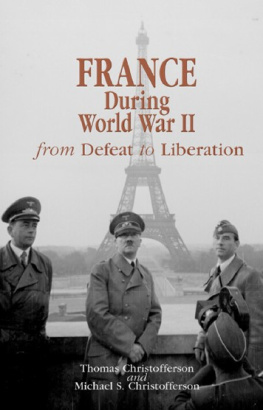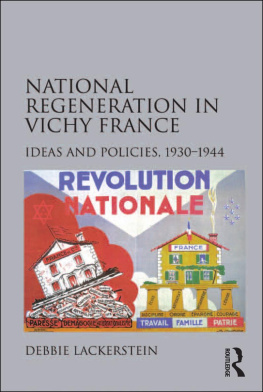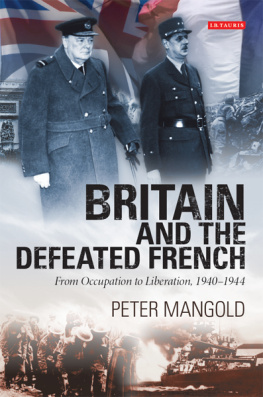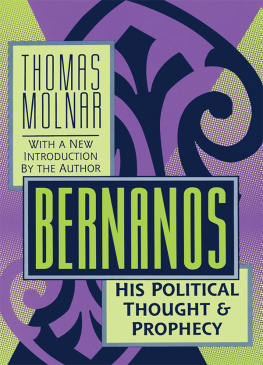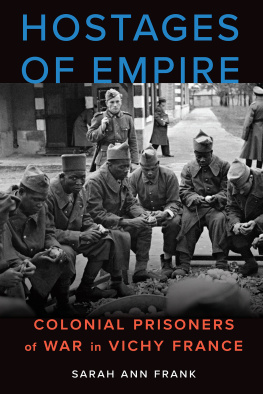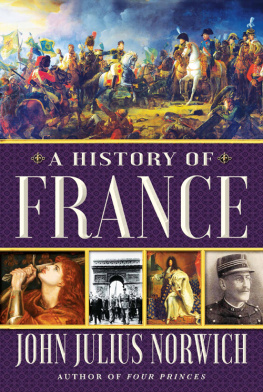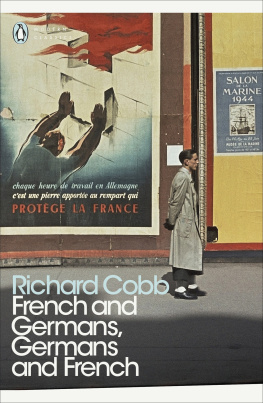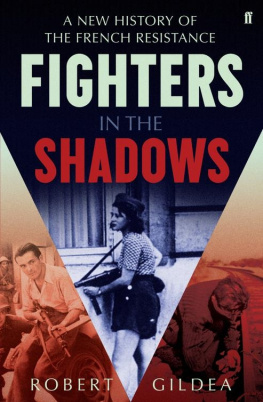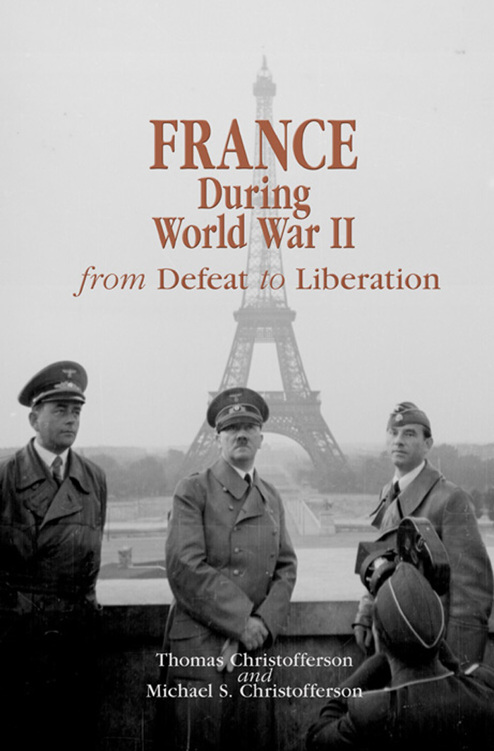Thomas R. Christofferson wit h Michael S. Christofferson
Fordham University Press | New York 2006
Copyright 2006 Fordham University Press
All rights reserved. No part of this publication may be reproduced, stored in a retrieval system, or transmitted in any form or by any meanselectronic, mechanical, photocopy, recording, or any otherexcept for brief quotations in printed reviews, without the prior permission of the publisher.
World War II: The Global, Human, and Ethical Dimension, No. 10 ISSN 1541-0293
Library of Congress Cataloging-in-Publication Data
Christofferson, Thomas Rodney, 1939
France during World War II : from defeat to liberation / Thomas R. Christofferson with Michael S. Christofferson.1st ed.
p. cm.(World War IIthe global, human, and ethical dimension, 15410293;
no. 10) Includes bibliographical references and index. ISBN 0-8232-2562-3 (hardcover : alk. paper)ISBN 0-8232-2563-1 (pbk. : alk. paper)
World War, 19391945France. 2. World War, 19391945Campaigns France. 3. FranceHistoryGerman occupation, 19401945. 4. FranceSocial
| conditions20th century. | I. Title: France during World War Two. | II. Title: France |
|---|
| during World War 2. | III. Christofferson, Michael Scott. | IV. Title. | V. World War |
|---|
| IIthe global, human, and ethical dimension; 10. |
|---|
| D761.C48 | 2006 |
|---|
| 940.53 44dc22 |
|---|
| 2006006872 |
|---|
Printed in the United States of America 080706 54321 First edition
Content s
Abbreviations ix Preface xi Defea t o f Franc e Nationa l Revolutio n Collaboratio n Exclusio n Resistanc e Liberatio n Epilogue 197 Further Reading in English 205 Notes 211 Index 237
Abbreviation s
BBC British Broadcasting Corporation CFLN Comite francais de la Liberation nationale CFTC Confederation francaise des travailleurs chretiens CGT Confederation general du travail CGQJ Commissariat general aux questions juives FFI Forces francaises de linterieur LVF Legion des volontaires francais contre le bolchevisme MUR Mouvements unis de la Resistance
NRF Nouvelle Revue francaise
OCM Organisation civile et militaire OSE Oeuvre de secours aux enfants OSS Office of Strategic Services PPF Parti populaire francais PQJ Police aux questions juives RNP Rassemblement national populaire SA Sturmabteilung SFIO Section francaise de lInternationale ouvrie`re SOL Service dordre legionnaire SS Schutzstaffel STO Service du travail obligatoire TC Temoignage chretien UGIF Union generale des Israelites de France
Prefac e
This is a book about France during the Second World War, a subject that has been discussed and debated passionately by the French for the past sixty years, replacing the French Revolution as the event that most seriously divided the nation into warring factions. Today, how ever, it seems that the divisive debate on Vichy has reached a point of exhaustion, maybe even a conclusion of sorts. Maurice Papons 1998 trial and conviction for crimes against humanity committed during World War II seems to have ended a long, arduous period in which the French judicial system attemptednot always successfullyto bring the remaining French and German violators of human rights to justice. No more trials are in the offing, mainly because no one is left to be tried. The World War II generation is rapidly dying off in France and with it the memory of what occurred during that dark age.
In any case, the issues that divided France during the war are no longerrelevanttoday.The EuropeanUnion and theeconomicmodern ization of the past sixty years have put an end to the True France of peasants, folklore, rural values, and the like that produced Vichys nostalgic, vicious counterrevolution, better known at the time as the National Revolution. Vichys motto, Work, Family, Fatherland [ Tra vail, Famille, Patrie ] no longer applies to a France in which cohabita tion has replaced marriage, the thirty-five-hour week has redefined work, andthe broader European community haschanged themeaning of the nation state. Vichys total failure to impose its vision on France during World War II discredited its ideology, preparing the way for an urban nation with social, political, and economic structures radically different from those of the past. Today, the National Front is the only serious political remnant of the old regime in France. Its strength should neither be underestimated to encourage complacency in the face of extremism nor exaggerated to raise a false specter of fascism gaining power. Nevertheless, in the 2002 election, the French people rejected the Fronts candidate for president by a margin of 82 to 18 percent,proclaimingloudlyandclearly thattheextremist ideasupheld by the Front did not represent France.
Finally,thankstoadvancesinhistoricalscholarship,including care ful studies on collaboration, anti-Semitism, resistance, and the like, we can make judgments and reach conclusions with a complexity of perspective that historians did not possess until recently. As this book will show, France was a potpourri of resisters and collaborators, anti-Semites and philo-Semites. There was no French exceptionalism, no shiningResistancemovementthatstoodheadandshouldersabovethe other such movements in Europe. Nor was France notorious as a na tion of collaborators or anti-Semites. Put simply, Frances record on these issues was no better or worse than that of other western Euro pean countries under Nazi rule, although it should be noted that such comparisons are difficult since each country faced unique situations, including moral dilemmas leading often to surprising outcomes.
Nevertheless, certain judgments can be made about this period of Frenchhistory.Weknow,forexample,thatinstitutionsfailedmiserably during World War II, including the military, the political system, the Vichy government, the Church, and the educational system. As we pro ceed, we will see that France could have won the opening battles of World War II had it not been for the total failure of military and politi cal elites to act properly and decisively. In the Vichy regime and the National Revolution (which is the subject of the second chapter) elites offered the French little more than collaboration and exclusion as prin ciples of governance. As a result, millions of French men and women suffered severe hardship under the draconian terms of the armistice and collaboration, while Jews, Gypsies, Freemasons, and communists were excluded from French society, incarcerated in concentration camps, andespecially in the case of the Jewseven killed. Sadly, the French Catholic Church went along with much of this, although a few members of the hierarchy spoke out against Vichy and the Nazis.
The heroes in France during World War II were not institutions but individuals and communities that acted upon their convictions, whether secular, religious, ethical, or cultural in nature. Collaboration, as thethirdchapterargues,was popularamongonlya smallminorityof the French. Almost from the beginningcertainly from the Montoire meeting between Petain and Hitler in late October 1940the French people rejected collaboration between France and Germany. Regardless of public opinion, collaboration remained a French government policy to the bitter end of the war. Nor did the French accept Vichys anti-Semitic acts, even though the vast majority thought ill of the Jews, as numerous polls revealed during the 1930s and 1940s. As chapter 4 points out, although French gentiles were mostly unconcerned by the anti-Semitic legislation of 1940 and 1941, they overwhelmingly op posed the roundups of Jews and other anti-Semitic actions undertaken by the Vichy government beginning in 1942. Individual acts to protect the Jews helped save thousands from the Nazi extermination camps. Even Vichy listened to the outcry against the roundups of Jews and changed its policies after 1942 to thwart the Germans somewhat from achieving their goals. And finally, as the last two chapters argue, the Resistance providedthe means for French men and women of allpoliti cal cultures and backgrounds, from extreme right nationalists to ex treme left members of the Communist Party, to oppose collaboration and the Nazis and fight for Frances independence. In the end, these individuals played a major role, with the support of General de Gaulles Free French, in liberating France from Nazi occupation and creating a renewed republic under de Gaulles leadership. They were tarnished, imperfectheroes who mademistakes. Some ofthem remainedideologi cally close to Vichy or Pe tain while others seemed more like bandits than members of an idealistic political movement. Certainly, very few of them resembled the idealized Resistance figures that de Gaulle and the Communist Party depicted after the war ended.

